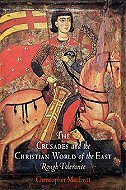The Crusades and the Christian World of the East:
Rough Tolerance
|
|
Christopher MacEvitt
|

|

In the wake of Jerusalem's fall in 1099, the crusading armies of western Christians (known as Franks) found themselves governing not only Muslims and Jews but also local Christians, whose culture and traditions were a world apart from their own. The crusader-occupied swaths of Syria and Palestine were home to many separate Christian communities: Greek Orthodox, Syrian Orthodox, Armenians, and other sects with sharp doctrinal differences. How did these disparate groups live together under Frankish rule?
In The Crusades and the Christian World of the East, Christopher MacEvitt marshals an impressive array of literary, legal, artistic, and archeological evidence to demonstrate how crusader ideology and religious difference gave rise to a mode of coexistence he calls "rough tolerance." The twelfth-century Frankish rulers of the Levant and their Christian subjects were separated by language, religious practices, and beliefs. Yet western Christians showed little interest in such differences. Franks intermarried with local Christians and shared shrines and churches, but they did not hesitate to use military force against Christian communities. "Rough tolerance" was unlike other medieval modes of dealing with religious difference, and MacEvitt illuminates the factors that led to this striking divergence.
Christopher MacEvitt teaches religion at Dartmouth College.
|
|
